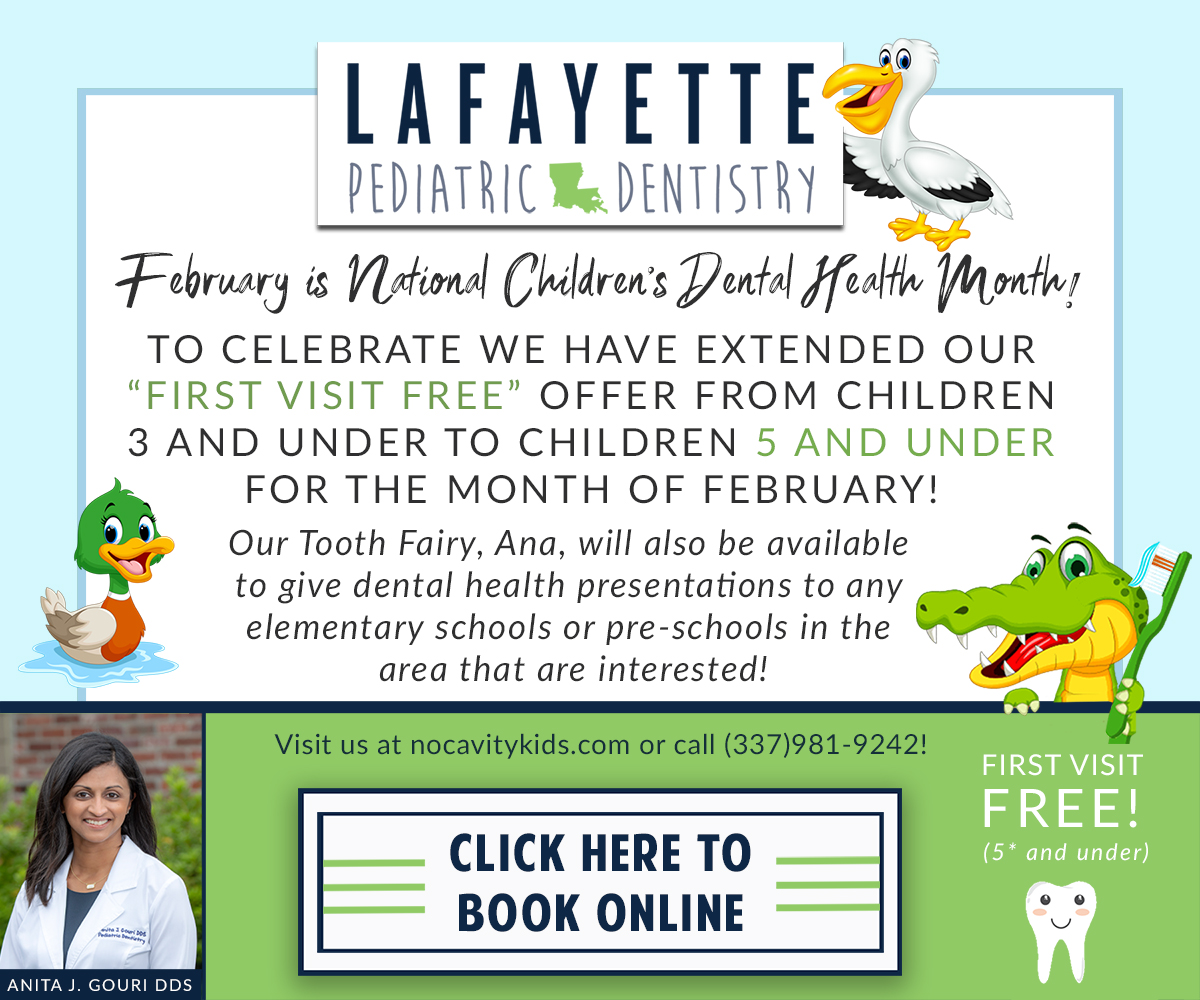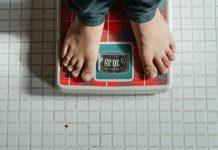Disclaimer :: This post is sponsored by our friends at Lafayette Pediatric Dentistry and authored by Pediatric Dentist, Dr. Anita Gouri.
Brush Up On Our “Floss-ophy” For Children’s Oral Health: It’s Not As Simple As You Might Think!
Dental cavities are the most common chronic childhood disease. If your child has cavities in early childhood, he or she WILL get more cavities, which will need to be fixed again and again. Proper routine dental care must be established at home in order to prevent this, but true application of dental health care often gets minimized in our busy daily routine.
In honor of National Children’s Dental Health month, I’d like to share the three most common misconceptions about proper dental care at home.
He brushes his teeth twice a day! How can he still have plaque on his teeth?
Children do not have the proper dexterity or focus to do a comprehensive brushing  themselves until age 8. And even after that age, children tend to rush through brushing. For these reasons, we always encourage parents to take an active role in brushing or their child’s teeth, or at least supervise that it’s done correctly.
themselves until age 8. And even after that age, children tend to rush through brushing. For these reasons, we always encourage parents to take an active role in brushing or their child’s teeth, or at least supervise that it’s done correctly.
- Brushing should be done in circular movements, also cleaning the edges of the gums, on all sides of each tooth, twice a day.
- For younger children, it is best to lie them down and brush, so to have better visibility of the molars.
- A tooth brush can’t clean between teeth. It’s that simple.
She never eats candy, how can she have all these cavities? She must just have bad teeth!
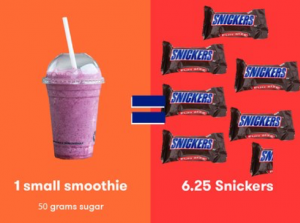 While genetics do play a small role in susceptibility to cavities, optimal home dental care is the most important factor in cavity prevention. Simply avoiding candy isn’t the way to keep the sugar bugs away. In today’s world, we are inundated with a barrage of processed, convenient, grab-n-go snack foods to help us fuel our modern, busy lifestyle. Unfortunately, the majority of these processed foods and beverages are very high in sugar and sometimes acid, which essentially feed the bacteria that cause decay! The frequency with which we consume these items, unlike candy and sweet treats, is much higher than we realize. Examples include:
While genetics do play a small role in susceptibility to cavities, optimal home dental care is the most important factor in cavity prevention. Simply avoiding candy isn’t the way to keep the sugar bugs away. In today’s world, we are inundated with a barrage of processed, convenient, grab-n-go snack foods to help us fuel our modern, busy lifestyle. Unfortunately, the majority of these processed foods and beverages are very high in sugar and sometimes acid, which essentially feed the bacteria that cause decay! The frequency with which we consume these items, unlike candy and sweet treats, is much higher than we realize. Examples include:
- Juice in a sippy cup and cereal in a Ziploc bag that a toddler grazes on throughout the day
- A week of entire afternoons drinking sports drinks like Gatorade during football practice
- Snacking on high sugar and high acid items like sodas, energy drinks, and low-protein
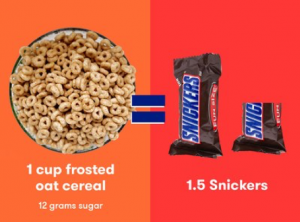 granola bars, which only lead to more frequent snacking on the same items an hour or two later
granola bars, which only lead to more frequent snacking on the same items an hour or two later - Gummy fruit snacks—not a substitute for whole fruit! Filled with sugar that remains stuck to your teeth long after the snack is consumed.
- Think you’re drinking nothing but whole fruit when you drink a store-bought smoothie? Think again!
So basically you’re saying I can’t give my child anything? That’s impossible!
Not true—I actually have given my children all of these items! Yes! It’s true that a dentist lets her children consume some of these bad products!! Just not with any regular frequency.
- Sugary beverages with a meal or snack only. No sipping in between or all day in a sippy cup or water bottle. “You sip all day you get decay.” The mouth needs time to recover from the sugar, which lowers the pH of the mouth to an ideal environment for cavity-causing bacteria.
- Smart shopping—check the sugar content of all the items you buy that are marketed as “healthy” and “contain whole grains.” There are plenty of much healthier, and still tasty, alternatives.
- Eat whole fruit, which gives you far more nutrients and fiber, than drinking fruit juice, which has virtually no nutrients (they fortify it) and all the sugar.
- Try homemade smoothies instead of store bought, which have higher sugar content
- There are plenty of electrolyte-filled drinks that do not have the sugar that Gatorade or Powerade does
- Just don’t buy it! If you have it they will sneak it. Avoid that brightly colored juice isle in
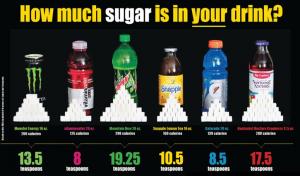 the grocery store at all costs. It’s easy to remember what they CAN drink with frequency: Water and plain milk. All other drinks are treats, which they will still get the outside the home at parties, on vacations, school activities, etc.
the grocery store at all costs. It’s easy to remember what they CAN drink with frequency: Water and plain milk. All other drinks are treats, which they will still get the outside the home at parties, on vacations, school activities, etc. - Make sure the toothbrush and floss are the last things in your child’s mouth at night. Since you do not salivate at night, anything consumed right before bed, other than water, with leave a bacteria-fueling residue on their teeth for 8 hrs.
…And make sure your child visits their pediatric dentist every 6 months for their checkups!!
IN HONOR OF NATIONAL CHILDREN’S DENTAL HEALTH MONTH, Lafayette Pediatric Dentistry is having a February special: First visit FREE for patients ages FIVE an under! Call us today (337) 981-9242 x1 or book online at NoCavityKids.com for an appointment!
For more information on Lafayette Pediatric Dentistry or Dr. Anita Gouri visit:
Website | Facebook | Instagram | Twitter
About the Author
 Dr. Anita Gouri, a pediatric dentist, has been practicing in Lafayette for 10 years and is the owner of Lafayette Pediatric Dentistry. She graduated from LSU School of Dentistry in 2006, receiving honors including Outstanding Achievement in Pediatric Dentistry, Honors in Research, and the Carl A. Baldridge Academic Scholarship. She completed her residency in pediatric dentistry at Children’s National Medical Center in Washington DC in 2008 and became a board certified diplomate of the American Board of Pediatric Dentistry in 2009. In 2010, her research on dental pain assessment was published in Pediatric Dentistry. She also has specialized training in treating babies and children who have tongue and lip ties. She is a member of the Academy of Laser Dentistry, American Academy of Pediatric Dentistry, the Louisiana Dental Association, the Southwestern Society of Pediatric Dentistry, American Dental Association, as well as the C. Edmund Kells and Omicron Kappa Upsilon Dental Honor Societies. Dr. Gouri, her husband, and their two children enjoy travel, Saints football, good food and good friends.
Dr. Anita Gouri, a pediatric dentist, has been practicing in Lafayette for 10 years and is the owner of Lafayette Pediatric Dentistry. She graduated from LSU School of Dentistry in 2006, receiving honors including Outstanding Achievement in Pediatric Dentistry, Honors in Research, and the Carl A. Baldridge Academic Scholarship. She completed her residency in pediatric dentistry at Children’s National Medical Center in Washington DC in 2008 and became a board certified diplomate of the American Board of Pediatric Dentistry in 2009. In 2010, her research on dental pain assessment was published in Pediatric Dentistry. She also has specialized training in treating babies and children who have tongue and lip ties. She is a member of the Academy of Laser Dentistry, American Academy of Pediatric Dentistry, the Louisiana Dental Association, the Southwestern Society of Pediatric Dentistry, American Dental Association, as well as the C. Edmund Kells and Omicron Kappa Upsilon Dental Honor Societies. Dr. Gouri, her husband, and their two children enjoy travel, Saints football, good food and good friends.











